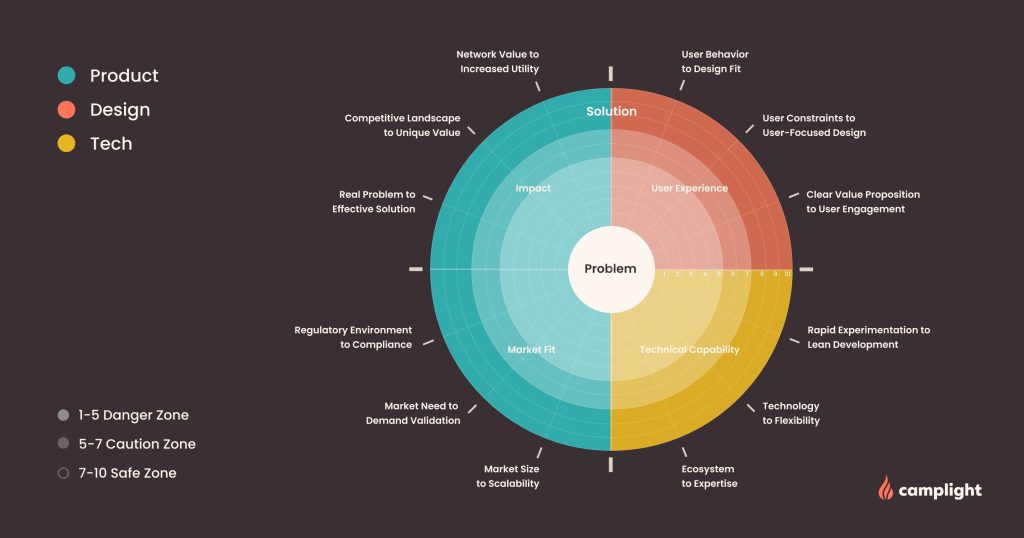Imagine embarking on a grand voyage across the ocean, only to encounter a rare and devastating “black swan” storm that threatens to sink your entire ship.
This scary scenario is similar to what businesses face when they start working on a new product but skip Product Discovery. This is the first and most critical phase of the venture building process and its absence may lead to disastrous results.

Product Discovery ensures that your product development, marketing strategies, and scaling efforts are all rooted in a deep understanding of market needs and user demands. To put it briefly – you have to do your homework before investing in a product no one may need.
It does not matter if you are a startup or a well-established enterprise, the benefits of thorough Product Discovery are immense and can make the difference between smooth sailing and catastrophic failure. Venture studios, including those offering venture studio-as-a-service, emphasize the importance of this phase to prevent costly missteps.
Let’s share our experience with Product Discovery and help you chart a course for smoother waters and a higher likelihood of success.
Why Do We Believe That Product Discovery Is Important for Everyone?
When we say “everyone” we mean it. It doesn’t matter if you are a startup founder or you run a corporation, the Product Discovery phase is not to be skipped.
For startup founders, Product Discovery is like checking your ship’s compass before setting sail. It ensures early-stage validation by confirming that the core problem and proposed solution are aligned with market needs. This prevents costly misdirection.
Additionally, it acts as a vital risk management tool, helping you navigate around potential icebergs that could sink your venture before it even leaves the harbour.

For corporations and enterprises, Product Discovery is akin to charting new waters for innovative exploration. It fuels the development of new features and groundbreaking products, enabling successful entry into uncharted markets through corporate venture building. The integration of venture design principles and venture architecture frameworks helps align new ventures with strategic goals and market demands.
When Is Product Discovery a Must?
We tried to think of all the scenarios when the Product Discovery phase is an absolute must and came up with the list below:
- Starting Your Business: You cannot start a business without validating the initial concept and ensuring the core problem and potential solutions resonate with market needs. The same goes for building a product from scratch.
- New Feature Development: Before investing in new features, make sure they address current needs and enhance the product effectively.
- Exploring New Markets: Assess opportunities and validate your approach to entering new markets.
- Venturing into New Industries: Understand the new industry dynamics and user requirements through discovery.
- Navigating High Competition: Get to know your competition with a thorough discovery and find out how to differentiate your product and gain a competitive edge.
- Managing High-Risk Ventures: Reduce risks and increase the chances of success in high-stake projects.
- Managing Large-Scale Projects: These come with hundreds of tasks, take a longer time for execution, and require extra oversight. The discovery phase helps you find the right direction.
- Validating Product Ideas: Ensure your product ideas are viable before full-scale development.
- Solving Customer Pain Points and Improving User Experience: Successful products are all about satisfied customers. Effectively address pain points through targeted discovery.
Frameworks and Playbooks for Effective Product Discovery
In this section, we want to show you the methods that will help put Product Discovery into practice effectively.
At the start of every business, you need to ask yourself a few questions first. Do you have a clear vision of your goals, requirements, and potential challenges? Is your business model well-defined and reliable? If these elements are vague or uncertain, it’s a clear sign that a Discovery phase is essential.
One thing you can do is to consider using the Risk Radar model. It is an easy way to visualize potential risks and gain a better understanding of what might turn into rough waters during your sailing journey.

At Camplight, we help you build a solid business foundation using human-centred, lean, and agile methods. We leverage design sprints to accelerate the discovery process, reusing past experiences and knowledge to validate ideas quickly and align them with strategic goals. Learn more about our approach in this article.
The Lean Startup methodology and Business Model Canvas are other frameworks we can recommend. They provide a structured approach for testing and validating business ideas, ensuring they are market-ready before full-scale development.
Let’s not forget the Jobs To Be Done framework (JTBD) which fits the Product Discovery phase like a glove. It helps prioritize product development by focusing on the outcomes users want to achieve. Instead of starting with features, it examines the emotional, social, and practical needs driving customers to use your product.
These tools offer clear, practical steps for navigating the complexities of Product Discovery for both startups and established companies, especially within venture studios focusing on venture architecture and corporate venture building.
Deliverables of Proper Product Discovery
Now, let’s take a look at what you get in return if you go through the Product Discovery phase properly:
- Minimized Risks: Any potential risks would be addressed before they escalate.
- Secured Funding: Thorough discovery makes your venture more attractive to investors by demonstrating a well-researched and validated business idea.
- Improved Market Fit: The product aligns with user needs and market demand, thus increasing the chances of success.
- No Wasted Resources: Saved costs by preventing unnecessary development and marketing efforts, focusing resources on what truly matters.
“Theory Is Good but How Do We Put It into Practice?”
This is quite a relevant question. Let’s share the main approaches to conducting a successful Product Discovery.
DIY Approach:
- Customer Research: Conduct interviews, surveys, and focus groups to gather insights directly from potential users.
- Market Analysis: Use tools like Google Trends and industry reports to understand market demand and competition.
- Validation Tools: Utilize frameworks such as the Business Model Canvas and Lean Startup principles to test and validate ideas.
- Collaboration Tools: Employ platforms like Miro or Trello for brainstorming and organizing thoughts with your team.
Using Expert Consultants:
- Specialized Knowledge: Consultants bring in-depth expertise in market research, user persona development, and competitive analysis.
- Structured Approach: They provide a more organized and professional method for validating business ideas.
- Strategic Insights: Benefit from their experience in identifying market trends and user needs that might be overlooked.
Engaging with Venture Builders:
- Comprehensive Support: Venture builders offer end-to-end support, from initial discovery to scaling the product.
- Access to Networks: Gain access to a network of industry experts, mentors, and resources.
- Proven Frameworks: Utilize established methodologies and frameworks to streamline the discovery process and reduce time-to-market.
Conclusion
As you set sail on your entrepreneurial voyage, remember that Product Discovery is your map and compass. Just as a well-charted course can make the difference between smooth sailing and a stormy disaster, a complete discovery phase ensures that your product development is guided by clear insights and validated needs.
Don’t be afraid to invest time and effort into understanding user outcomes, testing ideas, and aligning with market demands. This is how you chart a safer, more strategic path. Whether you’re navigating the waters of a new startup, refining an established product, or leveraging the expertise of a venture studio, Product Discovery helps you avoid costly missteps and set a course for success.
The same goes if you’re running a big corporation and want to conquer new markets or simply improve the products you already offer. Venture studios and corporate venture building initiatives are pivotal in these efforts.
So, before you cast off, make sure your discovery phase is as robust and well-prepared as your vessel. And don’t forget that if you need help navigating these waters, we’re here for you! Drop us a line and let’s see where the journey takes us!

